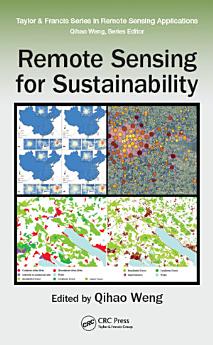Remote Sensing for Sustainability
eBook 정보
Bridging the gap between remote sensing and sustainability science this book examines theories and methods as well as practical applications of sustainable development for cities using remote sensing; focuses on remote sensing methods and techniques for sustainable natural resources with emphasize on forests; answers questions on how and what the remote sensing methods and techniques can do for the sustainability of environmental systems; and examines the issues of energy use and sustainable energy sources using remote sensing technology in countries such as Germany, China, the U.S, drawing on case studies to demonstrate the applicability of remote sensing techniques.
This comprehensive guide, which can serve to professors, researchers, and students alike, takes in consideration the United Nations set of sustainable development goals and intends to contribute to the GEO’s Strategic Plan by addressing and exemplifying a number of societal benefit areas of remote sensing data sets, methods, and techniques for sustainable development.
저자 정보
Dr. Qihao Weng is the director of the Center for Urban and Environmental Change and a professor of geography at Indiana State University, USA. In addition, he serves as editor-in-chief of ISPRS Journal of Photogrammetry and Remote Sensing and is the series editor for Taylor & Francis Series in Remote Sensing Applications. He received his PhD degree in geography from the University of Georgia in 1999. In the same year, he joined the University of Alabama as an assistant professor. Since 2001, he has been a member of the faculty in the Department of Earth and Environmental Systems at Indiana State University, where he has taught courses on remote sensing, digital image processing, remote sensing–GIS integration, GIS, and environmental modeling. He has mentored 15 doctoral and 13 master students. Dr. Weng’s research focuses on remote sensing and GIS analysis of urban ecological and environmental systems, land-use and land-cover change, environmental modeling, urbanization impacts and sustainability, and human–environment interactions. He is the author of more than 180 peer-reviewed journal articles and other publications and 9 books. Dr. Weng has worked extensively with optical and thermal infrared remote sensing data, and more recently with LiDAR data, primarily for urban heat island study, land-cover and impervious surface mapping, urban growth detection, image analysis algorithms, and the integration with socioeconomic characteristics, with financial support from US funding agencies that include NSF, NASA, USGS, USAID, NOAA, the National Geographic Society, and Indiana Department of Natural Resources. From the American Association of Geographers (AAG), Dr. Weng has received the Outstanding Contributions Award in Remote Sensing in 2011 and the Willard and Ruby S. Miller Award in 2015 for his outstanding contributions to geography. In May 2008, he received a prestigious NASA senior fellowship. Dr. Weng is also the recipient of the Robert E. Altenhofen Memorial Scholarship Award by the American Society for Photogrammetry and Remote Sensing (1999), the Best Student-Authored Paper Award by the International Geographic Information Foundation (1998), and the 2010 Erdas Award for Best Scientific Paper in Remote Sensing by ASPRS (first place). At Indiana State, he received the Theodore Dreiser Distinguished Research Award in 2006 and was selected as a Lilly Foundation Faculty Fellow in 2005. Dr. Weng has given more than 90 invited talks (including keynote addresses, public speeches, colloquia, and seminars) and has presented more than 100 papers at professional conferences (including co-presenting). Dr. Weng is currently the coordinator for GEO’s GI-17, Global Urban Observation and Information Task (2016–2019). He has been the organizer and program committee chair of the biennial IEEE/ISPRS/GEO-sponsored International Workshop on Earth Observation and Remote Sensing Applications conference series since 2008. He previously held the following positions: national director of the American Society for Photogrammetry and Remote Sensing (2007–2010), chair of AAG China Geography Specialty Group (2010–2011), secretary of the ISPRS Working Group VIII/1 (2004–2008), and panel member of US DOE’s Cool Roofs Roadmap and Strategy in 2010.






